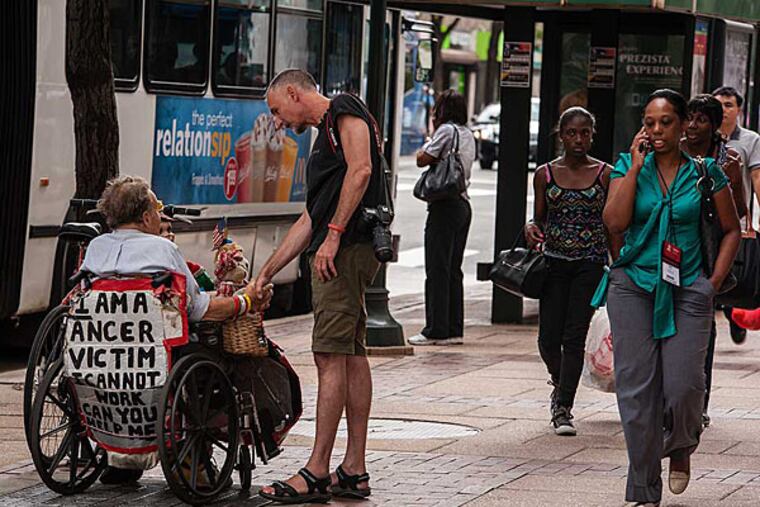An eye-opening year with Philadelphia's homeless
By Vincent J. Fumo During the past year, I have been volunteering with Sister Mary Scullion's Project HOME, riding with an outreach team headed by Sam Santiago, a former Philadelphia police officer.

By Vincent J. Fumo
During the past year, I have been volunteering with Sister Mary Scullion's Project HOME, riding with an outreach team headed by Sam Santiago, a former Philadelphia police officer.
Like many people, I used to not really see the homeless. Yes, I knew they were there, especially when I saw them during the winter sleeping on steam grates. But even then, they were just part of the "debris" on the street.
Most people prefer to be ostriches when it comes to the poor. A visible confrontation with the homeless and disturbed is not what they like to see.
Each Wednesday, either a registered nurse or social worker from Veterans Affairs assists our team. Some people may say the department is not doing its job, but I have seen it go above and beyond. Whenever we come in contact with a vet, he or she is given the direct and committed attention of VA personnel.
From my brief experience, I would estimate that 90 percent of the people on the streets these days want to be there. We go out and try to get them to come inside, but most times they refuse. Sam knows many of them by name. Our job is to keep on them until that day when they decide to come in.
The lost souls you see on the streets today fall into four categories.
First, there are the chronic alcoholics. They panhandle and prey on the guilt of passersby to get money to buy booze and stay drunk all day. A number of them sleep at night in places you would not believe. They can be found under the overpasses of Interstate 95 and other major highways. Some live in actual camps with tents and cardboard structures in vacant railway lots. Some sleep right on the Parkway, on mattresses they have pulled from the trash. If you saw the ingenuity they exhibit in building and "recycling" junk, you would be really impressed at their accomplishments.
Next are the drug-addicted, most of them heroin addicts. Today, apparently, heroin is cheaper than marijuana - so much for a return on the taxpayers' investment in the war on drugs.
Some of the homeless with drug and alcohol issues live on the streets and panhandle. But many have homes in shelters and subsidized housing, and they pretend to be homeless. Those homemade signs that say "Homeless and hungry" are no more truthful than tobacco advertisements suggesting that smoking is good for your health.
Next are the truly psychotic, people who refuse medical attention and wind up having hallucinations and acting out on the streets.
The last category are the con artists. They have homes but go out and make a pretty good living claiming to be "homeless," a "homeless vet," or some other category of person in need.
Part of my assignment in the last year was to interview some of the many people Project HOME has truly helped. They struggle every day to stay clean. Sometimes they fall, but they get back up and try again.
The one universal thing they all have said to me when I asked what got them to come in off the streets was: "I got tired of being tired."
My work this past year has really opened my eyes. And let me make a suggestion based on that service for the next time you trip over a human piece of "debris" on the streets of Philadelphia:
Please do not attempt assuage your guilt by giving them the money they beg for. That only makes the problem worse. Instead, tell them to "come in" from the cold to a shelter and back to life.